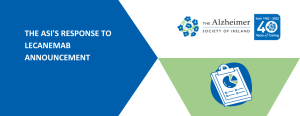The Alzheimer Society of Ireland Responds to Results of Lecanemab Trial

The Alzheimer Society of Ireland welcomes high-quality data and positive results from the Phase III CLARITY clinical trial on the efficacy of the Lecanemab antibody in slowing down the progress of Alzheimer’s Disease for people in the early stages of the disease.
The evidence was presented by representatives from the Japanese Pharmaceutical Company Eisai at the annual Clinical Trials in Alzheimer’s Disease (CTAD) conference in San Francisco early this morning. This followed encouraging top-line results issued by Eisai and Biogen in a September press release.
Lecanemab was shown to moderately slow down the progression of Alzheimer’s Disease, meeting the trial’s primary endpoint. Lecanemab is an antibody which targets a harmful protein called amyloid beta in the brain.
Eisai has filed for accelerated regulatory approval from the FDA. A decision is expected in early January, with applications to regulators in Japan and Europe to follow before the end of March 2023.
There are currently an estimated 64,000 people with dementia in Ireland, and by 2045, that number is anticipated to increase to 150,000.
Responding to this promising news, The ASI Research and Policy Manager, Dr Laura O’Philbin, said:
“Lecanemab is the most credible treatment option for Mild Cognitive Impairment and early Alzheimer’s Disease the world has seen after decades of work. While the clinical benefits appear small, scientifically, this is a pivotal development and brings hope to people concerned about dementia worldwide.
“There is a long way to go. Regulatory approval and developments in our health system are needed before we might see Lecanemab offered to people in Ireland. The Alzheimer Society of Ireland looks forward to continuing to collaborate with our research and clinical colleagues and government representatives.
This is a positive day, and it’s only the beginning of a better future in dementia”
